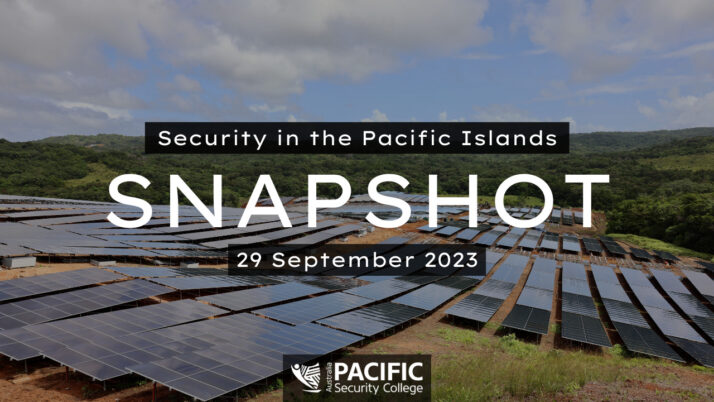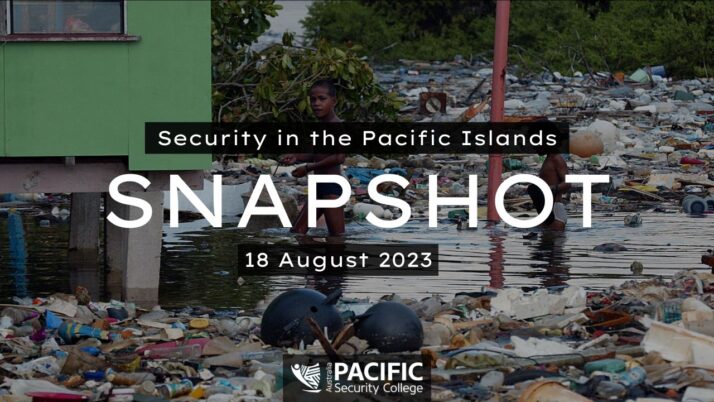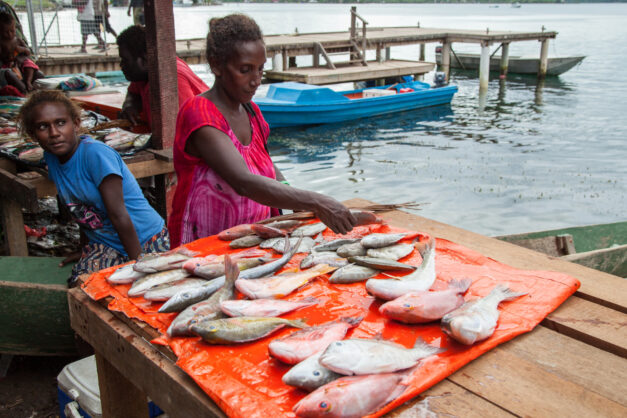Why local markets matter for Pacific security
Meg Keen, Elizabeth Kopel, Anouk Ride
Markets are crucial to food security and social stability in the Pacific, however, mismanagement is threatening these vital community resources, Elizabeth Kopel, Meg Keen, and Anouk Ride write.
In Melanesia, all roads lead to the market, a source of food, cash, information, and ultimately development. Local marketplaces are important public spaces and the only form of engagement with the modern economy for the majority of people. About 80 per cent of people in Papua New Guinea (PNG) and Solomon Islands work in the informal economy, many at markets or supplying them.
Sales of goods at markets is a major source of household income, good nutrition, local government revenue, and community vitality. While each transaction might be the equivalent of small change, annual revenues from council-run markets such as the Honiara Central Markets can exceed US$10–16 million each year. Vendor earnings from the smaller informal markets can be equally lucrative, and critical for community access to nutritious food.
For all these reasons, market management and related policies and regulations are crucial for economic prosperity and food security. It is in the national interest for local and provincial authorities to provide an enabling environment with appropriate policies, infrastructure, and services.
The recent pressures associated with COVID-19 – including reduced imports and travel restrictions – demonstrate how important local markets and food supply chains are to people’s lives and livelihoods.
In both Honiara and Port Moresby, knee-jerk closures of local markets to combat COVID-19 were quickly replaced with more sensible precautions to ensure people had food on the table. Evidence from PNG and Solomon Islands demonstrates how market management can affect livelihood and food security, and ultimately more sustainable development.
Formal recognition of markets, and clear roles and responsibilities, create security for investment and safe trading places. In East New Britain, PNG, the Market Development Authority Act established by the Provincial Government sets all the rules and regulations for operation, as well as penalties for non-compliance.
A governing board is responsible for good performance, and thus, accountability. The board comprises key stakeholders including vendors and women’s representation, and is chaired by the provincial administrator. In Lae and Alotau markets, these arrangements are similar but managed by local authorities. In these markets, strong accountability against clear expectations has resulted in greater security and better infrastructure maintenance compared to other, less regulated markets.
In Solomon Islands, performance is mixed given variability in market management. The central markets in Honiara, Gizo, Auki, and other provincial locations are subject to regulations and overseen by local council appointed market managers. Their capacity to enforce regulations varies depending on levels of support, resources, and political interference.
Informal roadside markets remain technically illegal, leading to shutdowns and restrictions being erratically enforced such as during COVID-19 restrictions. Their management, to the extent it exists, is dependent on local communities and the relations between vendors.
To provide greater empowerment to vendors, UN Women in collaboration with local governments have established women’s market committees in a number of Melanesian markets. These committees are made up of vendors who engage with the city councils’ market management and decision-making processes. This gives women, who make up about 90 per cent of vendors, a voice in theory; in practice influence is variable depending on individuals and vested interests. While they can raise issues of concern with local councils, such as poor facilities, they have little sway over budgets and rules.
Most municipal markets lack basic infrastructure and amenities. This is partially due to poor resourcing and management, but also a lack of political commitment and bad design. For instance, Mt Hagen market in PNG was redeveloped at the cost of millions with Australian aid funds. In just a few years, toilets were not working, and water and electricity were disconnected due to poor management.
Out in the provinces, things are improving, but even new facilities appear to have significant shortcomings when design and management falter. The Gizo market in Solomon Islands was opened in 2020, but women fish sellers report still having to sell produce in the sun without shade or refrigeration, leading to spoiling and considerable economic losses.
In the absence of strong policy and regulatory frameworks, markets can easily be subject to bias and corruption in their management and distribution of benefits. Market managers can be akin to political appointees, and can confer rights over revenue collection. In the case of Mt Hagen market, formal and transparent recruitment processes are not followed and employees come from local landowner groups with political links to local government leaders. These are mainly young men, without any formal training or skills, who add little value to improving services while lining their pockets.
When there is confusion over the distribution of market revenue, market management suffers. In Mt Hagen Rural and Huhu, the local level government kept all revenue as they claimed market ownership, but the provincial governments believed revenue should be shared to cover costs of urban services, ultimately withholding market waste removal in the stand-off.
Models of good performance help to sustain earnings and supply chains. Kokopo market in PNG stands out, largely due to the oversight by a qualified and experienced market manager, coupled with a dedicated team of skilled personnel including an accountant, human resource manager, and a public health and nutrition specialist. They monitor and enforce hygiene and food safety, and plan for infrastructure maintenance.
In Gizo market in Solomon Islands, revenue collection and water and sanitation facilities are tendered out to local companies to run and maintain. Key to success is allocating rights for service provision and paying for work done well. Payment can be monetary or through strengthening community relationships. In response to a deficit in services, some informal markets in Solomon Islands leverage community networks to provide their own security guards to patrol markets and reduce crimes like bag snatching and drug abuse.
Market policy and regulation with clear governance systems can create safe and prosperous trading spaces, particularly for women and their families. Combining policy, community engagement, and transparent and reliable systems, creates markets that can contribute to food security, good nutrition and livelihoods, securing development dividends.
More Stories

Security Snapshot - 29 Sep 2023
Pacific Security Snapshot | 29 September 2023
The security stories shaping the region ➣ 2nd United States-Pacific Islands Forum Summit ➣ Niue and Cook Islands forge diplomatic ties with United States ➣ Chinese navy vessel arrives in Papua New Guinea ➣ Pacific climate change advocacy at the United Nations ➣ El Niño is officially declared ➣ Fifteenth Pacific Health Ministers Meeting in…

Security Snapshot - 18 Aug 2023
Pacific Security Snapshot | 18 August 2023
The security stories shaping the region ➣ Pacific Resilience Facility endorsed at the Forum Economic Ministers Meeting ➣ The Pacific Climate Security Assessment Guide ➣ French President Macron visits Papua New Guinea and Vanuatu ➣ US Secretary of State and Secretary of Defence in the Pacific ➣ Bougainville eruption leaves 8,000 displaced Climate Security Ministers…







